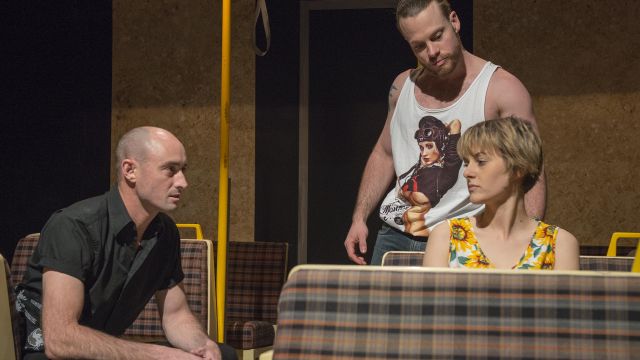The Return
Contemporary psychological thrillers are difficult for theatre companies to stage because the tension that must be present to unsettle and therefore satisfy audiences can be difficult to achieve and even harder to sustain. When the script contains a liberal amount of dark humour the task of balancing the laughs with maintenance of suspense is a very challenging one indeed.
In tackling Reg Cribb’s The Return, The University of Adelaide Theatre Guild has taken on just such a challenge and as we can expect from this company, has created an immersive and commendable production.
However, in the latter half of the play, the script lurches into unlikely coincidences. For me, the storyline then loses believability to some extent and this contributes to a lessening of the intrinsic sense of menace and suspense.
 Recently released from prison, career thug Steve and his junior partner in crime Trev decide to take the last train from Midland to Fremantle. It’s a stifling hot night. Bored, restless and looking for trouble, the two discuss their disadvantaged existence. When a beautiful law student steps into their carriage and two other passengers arrive a little later, the thugs have new victims. But just who will be the real victims on this night?
Recently released from prison, career thug Steve and his junior partner in crime Trev decide to take the last train from Midland to Fremantle. It’s a stifling hot night. Bored, restless and looking for trouble, the two discuss their disadvantaged existence. When a beautiful law student steps into their carriage and two other passengers arrive a little later, the thugs have new victims. But just who will be the real victims on this night?
Inspired by guilt to write The Return after personally witnessing a pair of hoods harassing a woman on a Fremantle train and doing nothing to help her, Reg Cribb has written a piece that includes strong themes and language; it’s a play definitely for mature audiences only.
Directed by Erik Strauts, the cast manage the physically demanding action very well, particularly on the ‘train carriage’-sized set, which is confined to a strip in the central section of the Little Theatre performing space.
James Whitrow does a great job and is totally believable as Steve, the leader of the pair of thugs. Even so, I’d like to see the simmering anger and hurt lying just under the surface of the character developed a touch more in order to ramp up the overall tension in the carriage.
James King, in a very good performance as Trev, embodies a restless, amphetamine-fueled and troubled young man. He is often extremely funny, too. However, as with Steve, the explosive menace within Trev could perhaps be subtly more apparent in order to balance this humour, thus making Trev appear more unpredictable.
Sarah Cullinan produces a very natural performance as the young law student Lisa, while Steve Marvanek also does well as the writer.
 The standout and most sustained performance for me is that of Nicole Rutty as the downtrodden English housewife Maureen, a woman desperate to escape her mind-numbing existence for a new life. The minute she enters the carriage with her suitcase she is mesmerising and her first desperate and terrified outburst at the thugs lifts the tension immediately. A very fine performance.
The standout and most sustained performance for me is that of Nicole Rutty as the downtrodden English housewife Maureen, a woman desperate to escape her mind-numbing existence for a new life. The minute she enters the carriage with her suitcase she is mesmerising and her first desperate and terrified outburst at the thugs lifts the tension immediately. A very fine performance.
Erik Straut’s ‘train carriage’ set design is apparently simple but startlingly effective, even including authentic train seats. Lighting design by Richard Parkhill is fantastic, brilliantly creating the effect of a moving, regularly stopping train. Erik Straut’s sound design is very good too, including realistic announcements when train doors close and when the train arrives at stations. The use of projection to identify train stations is excellent.
The Return is absorbing and unsettling. This very good Adelaide Theatre Guild production of the play is another example of the company’s readiness to push dramatic boundaries in order to give Adelaide theatregoers fine alternatives to the regular fare of community theatre.
Lesley Reed
Images (from top): James Whitrow, James King and Sarah Cullinan, James Whitrow with James King in background, and James Whitrow and James King.
Subscribe to our E-Newsletter, buy our latest print edition or find a Performing Arts book at Book Nook.

